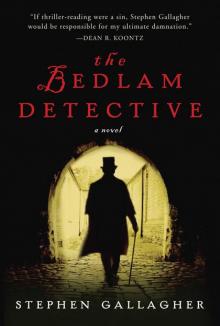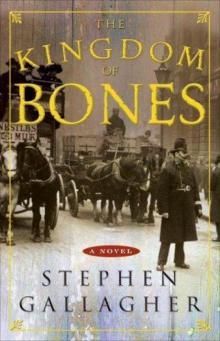- Home
- Stephen Gallagher
The Boat House Page 23
The Boat House Read online
Page 23
She didn't even glance his way. He waited as she crossed the forecourt and disappeared around the back of the reception block, intending to go into the kitchen the moment that she was out of sight. But he almost couldn't bring himself to move; something had slipped through his senses and his intellect and found the coldest spot in his soul… and now, having been touched, the cold spot was spreading.
And before he could begin to fight it, every damned light in the place came on.
He'd assumed that she'd be restarting the generator, but he hadn't been expecting this; all of the switches must have been down when the generator had failed. He could take her now; he'd seen enough.
But he slipped around the corner, where she wouldn't be able to see him and where he could watch her from another window.
Her returning footsteps were as even and confident as before; and although he was placed so that he couldn't see her, he could see her long shadow thrown out in three overlapping versions by the floodlights. She seemed to be carrying something, but he couldn't tell what. He heard the cafeteria door open, and then bang shut again.
Aldridge eased himself level with the window and paused to take another look, more carefully this time because he knew that there was more of a chance that he might be seen. The kitchen now blazed white under row after row of unshaded fluorescent tubes, the spilled water on the grey tiled floor making a long, mirror-like trail from the gap to the loading bay. Where previously the open doorway had been a square of light, it was now a square of darkness,
The waitress was back at the freezer. Now he could see what she'd been carrying.
It was a ski stick. A pretty obvious thing to find lying around, considering the nature of the place. It was the fibreglass type, about three feet long, with a slim metal spike at one end and a wrist loop at the other. She'd climbed onto the top of the appliance again, holding the stick in her left hand; in her right was the wooden mallet from the carpenter's own toolkit.
She positioned the spike carefully in the open freezer below her. Then she raised the mallet, and gave the top of the stick a single, hard blow to get it sited. There was a lot of spring in the shaft and the job wasn't easy, but the stick seemed to go in about an inch. When she paused to change her grip, the stick stood up on its own.
It was hard going. Aldridge watched, unable to drag himself away, as the ski stick was hammered fraction by fraction into the body at the bottom of the freezer. Halfway through she had to change position, alter her angle a little; she gripped the stick with both hands and stirred it around, as if seeking the route of least resistance through bones and sinew.
Aldridge was sickened. Go in and stop her, he was thinking.
But he was also fascinated.
Twenty minutes or more must have gone by, twenty minutes of calm, patient work as the carpenter's corpse was efficiently spitted. Finally the waitress hopped down, went around to the other side, and thrust her arm in deep as if feeling for something; and then, apparently satisfied, she went over to the control box beside the door and pressed the button to lower the winch.
She used the nylon rope again, attaching one end to the wrist loop on the stick and the other to the winch's hook. Then, returning to the control box, she started the raising.
Slowly, Amis sat up.
His face was almost black. The ski stick had entered his chest just below the breastbone, and had taken a lot of his shirt through with it. There was no blood. He sat like a doll, newly baptised, water running from his hair; the fibreglass shaft was bent almost double, trembling with the strain of holding him up, and it seemed likely to break if the body should be raised any further.
But the waitress appeared to have planned for this. Stopping the winch before he could rise any more, she moved around behind the body with a second loop of the nylon line. Although he couldn't see exactly what she was doing, Aldridge could make a guess; he reckoned that she was throwing the loop over the protruding spike of the stick to centre his weight under the hook. This done, she returned to the winch control and continued the operation.
No rigor, it would seem. Amis came out hunched into the shape of the freezer's interior, but then he slowly began to unfold as if the dead matter was too dull and stupid to give anything better than a delayed reaction to the change in circumstance. He looked as if he'd been that way for some time. He was shoeless.
The waitress walked around him, sizing him up as he swung slightly in the breeze outside the open doors. The water still ran from his sodden clothes and skin, splashing down into the freezer from his dangling form.
A neat arrangement. The waitress seemed to be taking time out to appreciate her own work.
Which finally gave Aldridge the break that he needed to pull himself away. How long had he wasted, transfixed by the scene? Too long. He stepped back from the window and, walking as quietly as he could, headed for his car. He could make the arrest any time now, no problem; Aldridge stood about five-eleven, weighed around a hundred and seventy pounds, worked out with weights on rare occasions, could still swim a mile, and had once run a decent half marathon. The waitress was considerably smaller, and probably little more than half his weight. But he'd made his decision; he was going to wait and watch some more, and use the waiting time to get a head start on calling in some backup.
Because if she took the body down to the lake, and started to fake up yet another of those 'accidents'… well, he wouldn't just be grabbing her for Amis.
He'd be taking her for all of them.
The Venetz sisters' Renault stood before him, waiting for its gruesome load. He made a wide circle around it, and glanced back to be sure that he wasn't being followed.
Help would take something close to an hour to get to him. There would have to be CID, forensic, scenes of crime, press officers, the works. The valley would be like one big circus for a while, and the aftermath would probably never be forgotten.
He unlatched the door of the Metro.
"I owe you an apology," the waitress said.
THIRTY-EIGHT
He spun around. She was behind him, still a few yards away, but she must have been moving so silently that she could have been on him before he'd known it.
She said, "I think I made a mess of your radio."
He didn't need to look. The car hadn't been locked, and the radio was easy enough to reach. She must have done it all that time before, and she must have known that he was there and watching as she'd staked Amis and hung him up to dry. Waiting for him to betray himself, waiting for him to make a move. He couldn't even imagine how anyone could be so cool.
"Why?" he said. "Why have you done this?"
But she only shrugged. "We were a long way from the lake," she said, as if that would explain everything. "I'd planned to move him later, but… you got here ahead of me."
He was looking her over. She'd probably claw and scratch and struggle like a wild thing, but his size and strength would count for more as long as he was prepared to use them ruthlessly. Amis might have done the same, but he couldn't have been prepared.
"Miss Peterson, isn't it?" he said, trying to reassure her as he looked for a way to come in at his best angle, but she didn't reply. "It's all over, all right? Now let me help you."
She smiled in a way that he didn't understand.
"I've had your kind of help before," she said.
"Come on," he said, putting a cautious hand out to take her arm. "Get in the car with me. It's the best thing you can do."
She looked into his eyes.
It was as if a screen of humanity had dropped away behind her own, a screen that had been no more than paper thin. Aldridge was looking into twin pits that bored all the way down into Hades itself. The river of fear ran through him, and it ran cold. There was no question any more about what had happened or how, no bewilderment to be felt because now he saw. Nothing about her had changed, and everything was different. A hole had been punched in the fabric of reality, and a demon had stepped through.
A demon
that wore a young woman's skin; but no less of a demon for that.
"You don't know who I am," she said. "You've no conception of what I am."
"We'll find out," he said, taking her arm.
But her arm wasn't there.
Something hit him hard from behind, and he started to go down. His mind was out of step, unable to register what was happening. Something blurred before him and his head snapped around to the side, and then he hit the ground. He struggled to rise. She grabbed the back of his shirt in two handfuls and shook him like a rug, beating the breath out of him in two great shockwaves.
He lay there, numbed and dazed and dizzy and dismayed, and realised that she'd done all of this in a matter of maybe a couple of seconds. It was as if he'd been hit by a car.
She was lifting his feet.
She was dragging him toward the cafeteria.
He scrabbled for purchase with his hands on the new tarmac, and felt his fingernails tear. She had a grip like a blacksmith. He tried to raise himself and kick his legs free; she flicked him like a rope, and his head cracked hard against the floor.
He saw lights. They were like popping flashbulbs.
And he let himself go limp.
He wouldn't underestimate her twice. She was whip-fast and totally ruthless, like the maddest of mad dogs. Size wasn't the issue here and neither was strength, although she had plenty of that. He had some unofficial mace in the car, a little handbag-sized spray that he'd picked up somewhere and never had a use for. He wished that it was in his hand right now. He could zap her and then, while she was blinded and struggling, maybe he could get one wrist cuffed to an ankle.
They were almost at the cafeteria again. She dropped his legs, and walked over to open the doors.
He waited until he could hear the sound of the hinge, playing dead right up until that moment.
And then, without looking back, he launched himself up and he ran.
She was faster. She caught at the loose part of his shirt but he spun around and managed to pull free, sending her off-balance for a moment. He didn't stay to watch her recovery, but lit out at top speed for the only place of safety that he could think of; not the woods, where she'd move with ease, and not any of the buildings either.
He aimed for the generator shed, just a few yards away and around the corner.
The unmuted beat of the generator told him that the door would be open even before he could see it. He dived through and into the cage, slamming the cage door shut behind him and scrabbling for the key that he hoped to hell would still be in the lock. It was, but on the awkward side; he'd barely got it turned and out when Alina flew through the door and, without even attempting to stop, hit the bars hard. Her arm shot forward like a piston, grabbing for Aldridge as he dodged back.
She caught him, but only just. She missed his throat and took a pinch of the flesh under his chin; even then she might have been able to draw him closer, but the sweat of fear and exertion had made him slippery and difficult to hold. She held him for a second, but then he fell back against the thumping generator and left her clutching the air.
He was on fire. He felt as if he'd been nipped by red hot pincers, titanium crabs' claws with a brutal strength behind them. Alina slowly withdrew her arm, and held the bars with both hands.
She was smiling again.
She said, raising her voice to make herself heard, "I know someone whose wife loves him more than anything, but he's no longer sure that he loves her back. She lost his baby and he tries not to blame her, but he does. Isn't guilt a strange thing, Mister Aldridge?"
It almost worked; he was only a heartbeat away from throwing himself against the bars to reach her. If he did, it would be over. It took everything that he had to resist her. The cage wasn't big, but it was big enough; and as long as he stayed in the middle, he'd be safe.
"I could wait for you to come out," she said.
"Don't stay around on my account."
But she inclined her head slightly, as if conceding a point. "There's too much to be done," she said. "I suppose I'll have to find you later." And then, with her smile still in place, she moved to leave. The shutters had been restored.
"Give it up," he called after her. "You're finished."
She looked back at him.
"You mean, my secret's out?" she said. "You won't live that long."
He couldn't believe that it was going to be so easy; and he was right. She was busy outside for a time. Then he heard her on the roof. She was pouring something around and suddenly the hut was filled with the stink of petrol. It was the spare can from the back of his own car, at a guess. Quietly, alert to her every move, he turned the key in the cage lock and let the door swing open; and when he knew for sure that she was climbing down on the opposite side, he eased open the door of the hut itself and made a silent dash for cover.
A while after that, he heard the Renault leaving. Parts of the hut were already in flames by then.
Had he still been in the cage when the generator's tanks went up, he'd have been barbecue meat.
"Oh, Jesus," Pete said. "Oh, God Almighty."
"I know," Diane said. "I know."
"How can you really be sure it was the man who followed you?"
"You know I can't, he was too burned-up. But I know it was his car because of the pictures in the dust…"
"Pictures in the dust? Come on."
"…and because I got more than half of his number as he went by me after I'd stopped on the road. Same car, same man, Pete. He says that Alina's dangerous and the question we've got to face now is, do we believe him and what do we do about it?"
"I don't know," Pete said.
By the Toyota's interior light, he looked again at the cuttings that Diane had handed to him. They were out by the lake, having pulled off the road onto an unmade strip of soft shoulder that overlooked the water. It was a pleasant spot with a view, but at best there was space for no more than half a dozen cars. No one ever stopped here for long, and most went by and never stopped here at all. Some people had pulled in ahead of them, and had walked the few yards down to the shore with a big golden dog that was now splashing around after a ball. The long shadows of the mountains lay across the water, deepening by the minute.
On top of all the accident and incident reports that were in the familiar layout of the area's local newspaper, there were three or four sheets of facsimile paper with the header line of a London based cuttings library. Two of the faxed items were marked as coming from the Herald Tribune. The others were from something that he'd once heard of but had never before seen, the English language edition of Pravda.
Diane said, "Petrovna? Peterson? That's got to be her, hasn't it?"
And Pete nodded.
Diane went on, "I had to pay money to get all this, but it was worth it. She's mentioned by name in the index of some archive, as well. We could probably get a copy, but it's somewhere in Munich."
"Radio Liberty," Pete said absently, leafing through some of the other cuttings without actually reading any.
"She told you?"
"I think she mentioned it one time."
"She talked about all that to you? About being Russian and being in hospital, and everything? Then you know it's all true."
He closed the book. "I know that the first part is true. The first part. But she never told me she'd killed anybody."
"Oh, sure. She wouldn't want to hold back on something like that, would she? I mean, if it was me, I'd work it into the conversation every chance I got."
Pete said quietly, not meeting her eyes, "You can stop trying to sell this to me. You don't have to."
He was thinking; It's like there's two of me. One who knows what she wants, and the other who tells her what she can have.
He was thinking; Rusalka, you'd say heartbreaker. I have it on the best authority.
He was thinking of how the woodland seemed to know, falling silent when she stepped out; here walks madness, let it pass.
And even now in his he
art he could sense the lure of the Rusalka, her siren call to the hungry and the incomplete.
"I can believe it," he said. "I think I just… I just don't want it to be."
There was silence in the cab for a while. On the banking below them, the big golden dog emerged from the water and shook off a spray like a hail of diamonds.
Diane said, "What do you want to do?"
"I think we ought to talk to her," Pete said.
THIRTY-NINE
He watched the fire for a while. It was spreading to the main building now, running in tongues along the gutters. There was a big fire hose on a standpipe across the yard, but on its own it could be of little use. Sparks were lifting and floating toward the trees, dying like fireflies before the journey was completed; it would only need one to reach the tinder of the undergrowth, and he'd have the beginnings of a major woodland blaze on his hands.
But right at this moment, that was the least of his concerns.
The sight of destruction was almost hypnotic, but Aldridge tore himself away and made for his car. The keys were gone and his radio, as she'd promised, had been taken out, stamped upon, and neatly put back into its place. He had no less than three personal radios that were intended for issue to volunteer Special Constables and which could be clipped to a lapel or carried in a pocket, but all of these were at the house on their plug in charger.
He looked around. On foot, it would take him anything up to an hour to make it to the lights of home. He had to get a message through somehow. He wondered if there was a working phone in the ski centre itself.
The air inside was already hazy with smoke and, of course, the lights had failed; he made his way by the fireglow from the windows and found the phone in the place where the carpenter had been sleeping. He picked it up, and heard a tone. He dialled quickly, not knowing how long it would be before the line came down. The smoke was getting perceptibly thicker. Any minute now, the walls or the roof would burn through and he didn't want to be inside when that happened.

 The Boat House
The Boat House The Bedlam Detective
The Bedlam Detective Valley of lights
Valley of lights The Kingdom of Bones
The Kingdom of Bones